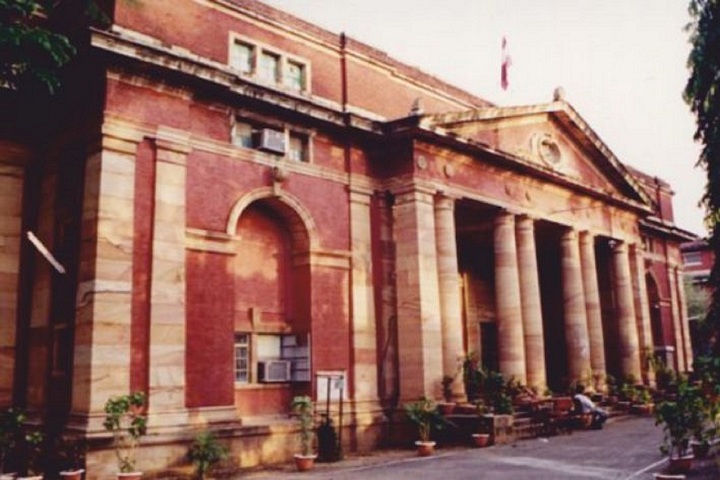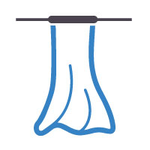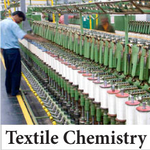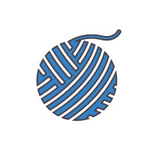
Textile Production Course Details - Fees, Subjects, Syllabus, Duration, Eligibility, Career Scope
Degrees offered: Diploma, B.E /B.Tech, Ph.D, B.Des, BS
What is Textile Production
The textile industry is one of the oldest and largest existing industries in India. It is widespread, ranging from traditional handwoven textiles to sophisticated machine-made textiles. Employees usually lookout for jobs that pay well, provide social protection to workers, and those that help in a social transformation. Textile production happens to meet all those criteria, and hence continues to be one of the most sought-after careers.
Textile production is the process by which fibres, filaments, yarn, and thread - both natural and synthetic - are made. The opportunities in the field extend from Textile Converter, Production supervisor to Industrial Engineer.
The constantly evolving and developing technology expedites the business to burgeon. As India is known for its notable culture and clothing, it makes the textile industry one of the most flourishing sectors of the country. This has encouraged students to take up careers in textile production.
Eligibility Criteria (UG & PG) of Textile Production
The eligibility criteria for textile production for most colleges remain similar. Besides that, some colleges conduct entrance examinations. If a student has the necessary marks, they usually provide admissions. Colleges also conduct interviews and take their decisions accordingly.
For Textile Production Undergraduate Course
Students need to complete their 12th standard with a minimum of 50% in science subjects.
The students need to have a background in science, with chemistry and maths as their main subjects.
Besides that, colleges conduct entrance exams. Students have to appear for the JEE Main or the entrance exam conducted by the respective colleges. The aspirant must obtain the minimum cut off specified by the respective institutions.
For Textile Production Post-graduate Level
The students have to have a degree in the same or equivalent course.
They must appear in the GATE examinations.
Admissions will be provided only if they perform well in the entrance exam.
Further, colleges conduct personal interview rounds and finalise the list based on the aspirant’s performance.
Entrance Examinations for Textile Production
Various colleges provide a degree in textile engineering. Admission into the colleges is only possible after the completion of 12th. Colleges usually admit aspirants if they obtain good scores in their entrance exams. Most colleges provide seats based on the student’s performance in the JEE exam. Other colleges conduct their entrance exams. These are the top entrance exams to prepare for if one wants to build a career in textile product.
JEE Main- The Joint Entrance Examination is one amongst the most competitive entrance exams conducted in the country. The examination is conducted at a national level for admission into B. Tech and B. Arch. courses. It is regulated by the NTA and selects candidates for admission into various government and private institutions.
JEE Advanced- JEE Advanced is a national level entrance exam conducted for admissions into the prestigious IIT and other colleges. It is the next exam after JEE Main and is a highly competitive exam. The exam requires sincere dedication and preparation and requires one to systematically study to crack the exam.
GATE- Graduate Aptitude Test for Engineering is a national level entrance examination for admission to postgraduate and doctoral courses offered by MHRD. It is conducted by IISc Bangalore and the seven IIT’s on a rotation basis on behalf of the National Coordination Board.
UPSEE- Uttar Pradesh State Entrance Examination is a state-level examination conducted by Dr A.P.J Abdul Kalam Technical University, UP. It paves the way for admission into various institutions in UP. By qualifying this exam, students can get admission into various UG and PG courses.
BITSAT- Birla Institute of Technology and Science conducts its entrance exam for admissions to undergraduate engineering courses at its three campuses at Pilani, Goa and Hyderabad.
VITEEE- Vellore Institute of Technology Conducts its entrance exam for admissions into UG and PG programmes. The Vellore Institute of Technology Engineering Entrance Examinations is one of the top entrance examinations.
College Predictors VIEW ALL
Scope of Textile Production in India and Abroad
The textile industry is one of the most dominant sectors and is constantly evolving and developing. The industry is one of the most successful and will continue to flourish in the coming years. It is one of those sectors that have great adaptability and sustainability. Hence a career in textile production will always be one of the most secure jobs.
Due to its wide range of opportunities, every year, the number of aspirants in textile production sector multiplies intensely. Moreover, the career profiles in this field are diverse. One cannot grow tired as it constantly requires the employers to put out more innovative, creative and unique products into the market.
The scope in textile production is extremely high, as it is already well established and functioning efficiently. With new-fangled techniques emerging every minute, this field sees nothing but maximal recruitment. A job in textile production field would favour you well both in India and outside India.
Course Fees Textile Production
| Minimum Fees | Maximum Fees | |||
|---|---|---|---|---|
| Private | Government | Private | Government | |
| PG | ||||
| DIPLOMA | ||||
Course Subjects
Mentioned below are the subjects covered under textile production:
Mathematics
Environmental Studies
Fibre Analysis
Yarn formation
Applied Mathematics
Design and Structure of Fabric
Fabric Formation
Textile testing
Instrumentation and control
Theory and design of textile machines
New generation Fibres
Industrial Engineering
Textile mill management
Garment technology
Values and ethics
Energy sciences
Entrepreneurship development
Robotics and control engineering
Computer simulation
At the end of the textile production course or semesters, colleges may require you to do projects based on which you will be graded.
Careers in Textile Production
The textile industry is one of the oldest industries. The industry has been evolving since then. New technologies, equipment, methods and designs are brought out on a daily basis. Those individuals who are interested in the textile industry and those who are interested in the manufacturing of yarns, fibres and other such raw materials should consider taking up Textile production. This field will always have great demand, as long as people are interested in fashion. Over the years, we see this industry growing and employing millions of people.
In the textile industry, there are various options. You could be a textiles engineer, a supervisor; you could get into research. Quality control personals are also of great demand. Besides these, you could get into teaching, manufacturing, designing and so on.
Upcoming trends
The future for the Indian textiles industry looks very bright. The industry is seeing a lot of aspirants enter the field. Textile engineers are coming up with new and innovative technology. The industry is seeing a lot of change and development. Here are a few upcoming trends that can be seen in textile production sector.
Technology- This the era of technology. The industry is adapting to new technology and slowly changing from handwoven textiles to machine-made. Over the years, adaptability and knowledge of technology will be one of the main skills needed.
Extinction of hand-made products.- Machine-made textiles have become cost and time effective. There has been a shift in machine production. Over the years, handmade clothes will begin to decline.
Shift to e-commerce- Marketing and sales have all shifted to online platforms. Hence traditional customers will also begin to shift to clothes that are available online. Hence knowledge of online platforms is a must.
Sustainable goods- There has been an awareness of sustainable living. Hence we see a gradual shift, where people resort to sustainable materials. Environmental friendly methods of production are on the rise.
Job Profiles and Top Recruiters
Job Profiles for Textile Production Graduates
In textile production, you can take up various job profiles. Textile production is not limited to the fashion and textile industry. Textile engineers are hired across various medical research programmes. They are even employed in various corporate management and research and development institutes. These are some of the popular job profiles in this field:
Job Profile | Description |
Medical Textiles Engineer | They are responsible for developing textiles that are used in the medical field for furnishing and other medical supplies. |
Process Engineer | Process engineers develop new industrial processes and designing processes that are beneficial to the industry. |
Operations Trainee | They are assigned certain tasks and are responsible for supervision. |
Quality control Supervisor | Quality control Supervisor, checks on all the products that are produced, before sending them to the market. |
Process improvement Engineer | Map and analyse processes and identify ways to reduce waste, improve workflow, and otherwise increase efficiency. |
Technical Salesperson | Technical sales personnel specialise in scientific and technologically advanced products and services. The role requires strong knowledge of technical and scientific products, including the functions and components that enable the products to work |
Researchers | Researchers spend time developing new fabrics and technology. They work toward making cost-effective products and developing processes and products that are in demand. |
Top Recruiters of Textile Production Graduates
Since it is one of the most popular careers, there is a lot of demand for the top companies. These companies come to colleges and provide placements to the students. Some of the top recruiters in this field are:
Mysore silk Factory
RIL textiles
Maftala Denim
Raymond group
Grasim Industries
Fab India
Arvind Mills Ltd
JCT Ltd
Lakshmi machine works
Lakshmi mills
Bhilwara Group
Reliance Textiles
Rajasthan Petro synthetics
Average Salary
The salary of fresher ranges between Rs. 30 to 50 thousand per month. The salary increases with experience in textile production industry.
Job Profile | Average Annual Salary |
Medical Textiles Engineer | Rs. 6.9 Lakhs p.a. (Approx.) |
Process Engineer | Rs. 4 Lakhs p.a. (Approx.) |
Operations Trainee | Rs. 2 Lakhs p.a. (Approx.) |
Quality control supervisor | Rs. 3 Lakhs p.a. (Approx.) |
Process Improvement Engineer | Rs. 9 Lakhs p.a. (Approx.) |
Technical salesperson | Rs. 9 Lakhs p.a. (Approx.) |
Researcher | Rs. 4 Lakhs p.a. (Approx.) |
Required Skillset for Textile Production
The textile production course and field require certain basic skill sets. Some of them are mentioned below.
Creativity- One of the most important skills is creativity. People working in the field have to think out of the box. One cannot succeed in this field with just textbook knowledge.
Adaptability- The field is always evolving and changing. Those who wish to work in this field should be open to change. They should always be open to new ideas and must always have the quench to learn more.
Technical skills and Critical analysis – Those with good technical skills and a critical eye tend to fare well in this field. It is important to be meticulous and be determined to deliver the best work.
Communication skills- Often, people have difficulty expressing their ideas and concerns. Failure in doing so can cause serious problems. Hence one must develop the skill of communicating effectively.
Teamwork- It is almost impossible to work in this field alone. You need inputs from various people, and you must be compatible with working in large numbers.
Course Curriculum for Textile Production
The textile production offers a B.Tech degree. The whole course is stretched across 4 years. It is an undergraduate degree programme in textile production that mainly focuses on technology, production and all the processes associated with the textile industry.
During these four years, the students are made to understand the basics of textiles. They learn about the processes and technologies involved in the industry. Focus is given on the practical aspects. They are exposed to a lot of fieldwork. They learn maximal utilisation of resources and learn to procure them at nominal value.
It is recommended that the students pursue a master’s degree in textile production. The master’s degree is for 2 years. A lot more specialisations are offered through this course. It is aimed at enhancing the technical skills of the students.
The students are provided with internships, some colleges also provide job opportunities to the students after the completion of the textile production course. A master’s degree will allow the student to work in jobs profiles that have a huger pay scale.
A master’s degree is usually sufficient. Some students go to complete their doctorate. Besides a degree, it is recommended that the students focus on their practical skills and enhance them while completing their studies.
Popular Textile Production Entrance Exams in India
Popular Textile Production Colleges in India VIEW ALL
Frequently Asked Questions (FAQs)
Question: Is textile production the same as fashion designing?
Answer :
They are similar, but they are not the same. Textile production is the field that deals with the procurement of raw materials and the manufacturing of fibres and yarns that are used to produce textiles. Fashion designing primarily deals with creating and designing clothes and textiles in creative and unique ways.
Question: Why should I take up Textile production?
Answer :
If you are interested in the production of cloth and the processes involved in it, you should consider textile production. Textile Industry is one of the oldest and well-established industries in our country. It employs millions and is one of the safest and promising industries.
Question: Which are the top colleges to study this course?
Answer :
IIT: Indian Institute of Technology, Delhi
Institute of Information Technology and Management, New Delhi
LD College of Engineering, Gujarat
College of Textile Technology, West Bengal
SSM Institute of Textile Technology and Polytechnic College, Tamil Nadu
University of Mumbai, Maharashtra
Bannariamman Institute of Technology, Tamil Nadu
Institute of textile technology, Orissa
Question: What course do I take up for textile production?
Answer :
Textile production is a specialisation in Textile Engineering. Hence after obtaining a degree in Textile Engineering, you can specialise in Textile production.
Question: Is a background in the science field mandatory for textile production?
Answer :
The main subjects of this course include chemistry and mathematics. Hence students must complete their 12th with Chemistry and Mathematics as their main subject if they want to pursue a career in this field.























